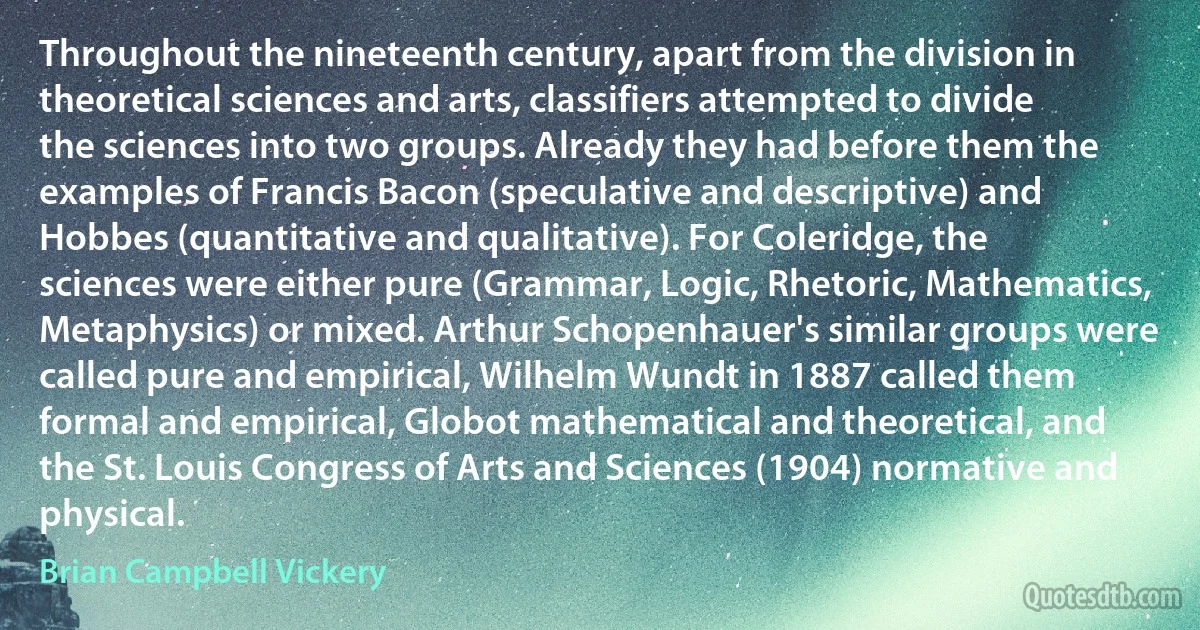
Throughout the nineteenth century, apart from the division in theoretical sciences and arts, classifiers attempted to divide the sciences into two groups. Already they had before them the examples of Francis Bacon (speculative and descriptive) and Hobbes (quantitative and qualitative). For Coleridge, the sciences were either pure (Grammar, Logic, Rhetoric, Mathematics, Metaphysics) or mixed. Arthur Schopenhauer's similar groups were called pure and empirical, Wilhelm Wundt in 1887 called them formal and empirical, Globot mathematical and theoretical, and the St. Louis Congress of Arts and Sciences (1904) normative and physical.
Brian Campbell VickeryRelated topics
apart bacon century congress descriptive divide formal grammar mathematics metaphysics nineteenth pure qualitative rhetoric louis normative coleridge hobbes sciencesRelated quotes
Logic is not concerned with human behavior in the same sense that physiology, psychology, and social sciences are concerned with it. These sciences formulate laws or universal statements which have as their subject matter human activities as processes in time. Logic, on the contrary, is concerned with relations between factual sentences (or thoughts). If logic ever discusses the truth of factual sentences it does so only conditionally, somewhat as follows: if such-and-such a sentence is true, then such-and-such another sentence is true. Logic itself does not decide whether the first sentence is true, but surrenders that question to one or the other of the empirical sciences.

Rudolf Carnap
The inversion theory has a long and fascinating history in the discussion of vertebrate origins. The founding version dates to the early nineteenth century and became the centerpiece of a movement often called "transcendental biology," and centered on the attempt to reduce organic diversity to one or a very few archetypal building blocks that could generate all actual anatomies as products of rational laws of transformation. Some of Europe's greatest thinkers participated in this grand, if flawed enterprise. Goethe, Germany's preeminent poet-scientist, tried to explain the varied parts of plants as different manifestations of an archetypal leaf.

Stephen Jay Gould
The bases of music are rhythm and harmony. Rhythm is ordered recurrence in time... As the planets move around the sun, they repeat their orbits periodically; thus there is already a primitive kind of rhythm in their motion.... Harmony... can be considered a special kind of rhythm.... pure musical tones are produced when the vibrations are... periodic or... repeat themselves regularly in time. Two tones harmonize if their intervals of repetition are in rhythm-or, in mathematical language, if their periods are in proportion. Kepler... in the third book of Harmonice mundi... attempted to make other... related, connections between musical harmony and mathematical proportion.

Frank Wilczek
What renders a problem definite, and what leaves it indefinite, may best be understood from mathematics. The very important idea of solving a problem within limits of error is an element of rational culture, coming from the same source. The art of totalizing fluctuations by curves is capable of being carried, in conception, far beyond the mathematical domain, 65 where it is first learned. The distinction between laws and coefficients applies in every department of causation. The theory of Probable Evidence is the mathematical contribution to Logic, and is of paramount importance.

Alexander Bain
There cannot be a greater mistake than that of looking superciliously upon the practical applications of science. The life and soul of science is its practical application; and just as the great advances in mathematics have been made through the desire of discovering the solution of problems which were of a highly practical kind in mathematical science, so in physical science many of the greatest advances that have been made from the beginning of the world to the present time have been made in earnest desire to turn the knowledge of the properties of matter to some purpose useful to mankind.

William Thomson
